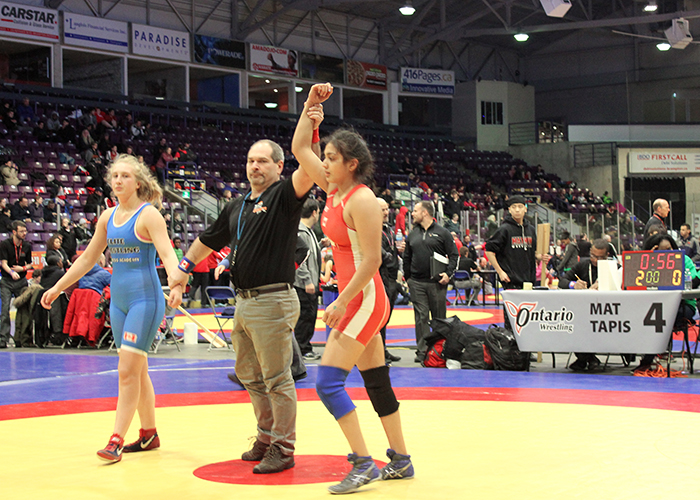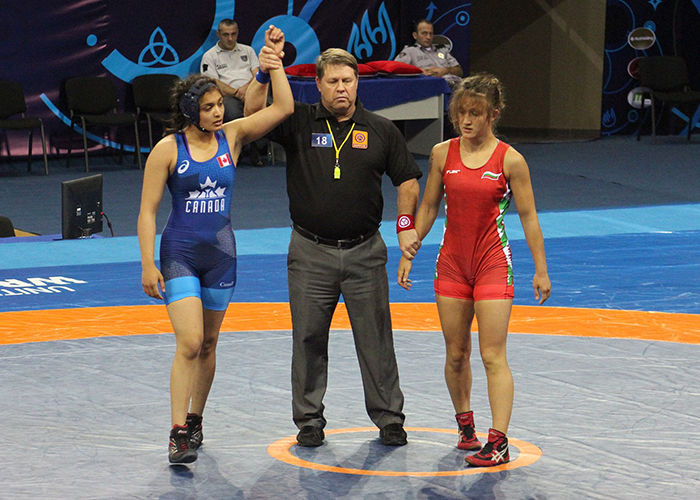
October 2, 2018 — For many students starting university, a question lurks in the back of their minds: how will they conquer this new challenge? For Kirti Saxena (MechE Year 1), thriving under pressure is just part of hertraining.
Saxena is a seasoned wrestler who has represented Team Canada at several world championships. Now, she’s ready to apply the work ethic, determination and perseverance she’s developed over years of practice and training to her next challenge: first year in U of T Engineering.
Saxena sat down with U of T Engineering News to share her plans for the year ahead — both in and out of the gym — and her approach to managing the demands of both training and school.
Why did you choose to join Mechanical Engineering at U of T?
I always preferred understanding how a problem was solved, rather than memorizing the the solution. I specifically chose mechanical engineering because in addition to being more science- and math-oriented, I am big on art and design. I’ve always wanted to be able to create and learn not only a design, but the mechanics and underlying factors that are crucial to the functioning of any structure or system.
What has been your most memorable moment in your sporting career to date?
I represented Canada internationally throughout most of my high school years [at Erindale Secondary School in Mississauga, Ont.], trained and competed in many tournaments around the world. My most memorable moment would have been when I competed in the Cadet World Championships in Tbilisi, Georgia. I was still a year younger than the qualifying age for a Cadet, so there were no expectations on me — it was more for the experience. I ended up performing the best out of everyone on Team Canada that year and qualified for the bronze medal match — I finished the tournament with the official placement of fifth in the world. Because of this I also received the award for “Best Cadet Wrestler” in all of Canada.

What are you most looking forward to about athletics at U of T?
I’m looking forward to the experience of being on a university team and being able to bring in some school pride by competing.
Will you continue wrestling for the national team during school?
If I qualify, I hope to be on one or two Team Canada teams for two different age groups —Under 19 and Senior-All. I train two to three times a day, and my ultimate goal is to compete and place at the Olympics. I intend to wrestle at the trials for 2020, but since I will still be fairly young and am currently recovering from knee surgery, the more realistic goal would be 2024 and various world championship medals throughout the years.
Can you share your approach to balancing school with competitive sport?
Time management, dedication and perseverance. Being able to strictly follow a pre-determined schedule is a must. There are certain times to eat, go to lectures, do homework and attend practice, and it’s vital to follow the schedule, even when you would rather stay at home wrapped in a blanket, sleeping all day.
Being able to follow such a busy and intense schedule calls for dedication, especially in a high-demand program such as engineering. Spending so much time working towards something so physically and mentally draining; it’s not an easy thing. Sometimes it takes away from being completely 100% during other aspects of your life, but the important thing is learning how to find the balance — or for all the engineers out there, the equilibrium. That’s when perseverance plays its part. You always have to be ahead of the game, especially academically. Procrastination is never an option, and preparing when you can is crucial, because you never know when you may miss a whole week of class due to a training camp abroad.
This story originally appeared on U of T Engineering News. The interview has been edited and condensed for length.